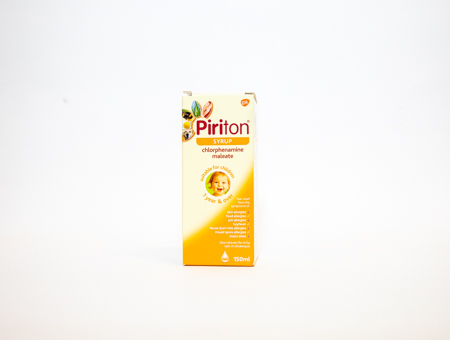Other Options Include
Introduction
Piriton provides relief from numerous symptoms you may be going through such as hay fever, skin allergies, pet allergies and insect bites and is suitable for use for anyone over the age of 1 years old.
What is Piriton and what is it used for?
Piriton is used to treat and control allergic symptoms associated with hay fever and other allergies. Piriton contains an antihistamine, chlorphenamine maleate, this active ingredient aids in relieving symptoms such as redness, swelling, itchiness and irritation.
Piriton can also be used for:
Hay Fever
Allergies for example house dust mite
Chickenpox
Heat rash
Insect bites
Nettle rash and hives
Dermatitis
Who can take Piriton?
Piriton comes in two forms, liquid and tablets.
Piriton Syrup is for children 1 years old and over
Piriton tablets are for adults and children 12 years and over.
How do I take Piriton and when should I take this?
Piriton Syrup:
This product comes with a spoon for an accurate dosage.
Please check the leaflet before use to find the appropriate dosage depending on the ages listed.
Children aged 1-2 - One 2.5 ml spoonful twice a day. MAX two, 2.5 ml doses/24 hours
Children aged 2 to 6 - One 2.5 ml spoonful every 4-6 hours MAX six, 2.5ml doses/ 24 hours
Children aged 6 to 12 - One 5 ml spoonful every 4-6 hours. MAX six, 5ml doses/ 24 hours
Children over 12 and adults - Two 5 ml spoonful's every 4-6 hours MAX twelve, 5ml doses/ 24 hours
Elderly- two 5ml spoonful's every 4-6 hours. MAX six, 5ml doses/24 hours
Piriton tablets:
Children aged 6-12 are required to take half a tablet every 4 to 6 hours with a MAXIMUM of 3 tablets in a 24 hour period.
Adults and children aged 12 and above must take one tablet every 4 to 6 hours, do not exceed the dosage.
FAQ
Can I take this if I am pregnant or breastfeeding?
Under extenuating circumstances your doctor may advise that you take Piriton whilst you are pregnant or breastfeeding however this decision needs to be made by your GP on a case by case basis. Always ensure you inform your doctor before starting any medication whilst pregnant.
Side effects and precautions
Not all patients will experience side effects however the common side effects reported with Piriton are impaired concentration, poor coordination, dizziness, dry mouth, fatigue, headache, nausea and blurred vision. If you experience any of these symptoms ensure you contact your doctor or pharmacist to discuss this further. Whilst you are taking this medication please ensure you avoid driving or handling heavy machinery.



